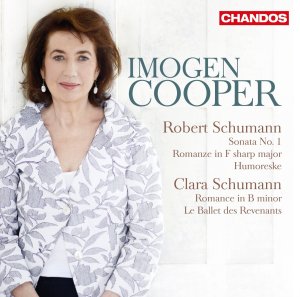Many pianists ruminate over the introductory section of Schumann’s Humoreske, but not Imogen Cooper, who doesn’t mistake the Einfach (easy) tempo indication for somber. Instead, her phrasing conveys an unusual and compellingly flexible feeling of two beats to a bar rather than four. However, the subsequent scampering Sehr rasch und leicht sounds relatively uneventful when compared alongside Cooper’s more spontaneously soaring 1994 Wigmore Hall broadcast released on a BBC Music Magazine CD (Volume III No. 10), or against the more diversely articulated Angela Hewitt and András Schiff editions.
Pallid and mushy textures characterize the Hastig section (where Schumann notates a “silent melody” to be heard within rather than actually played), exaggerated by the murky, overly resonant sonics; here Ashkenazy’s particular attention to the stepwise bass lines proves crucial. Cooper’s Einfach und zart episode is broader and more inflected compared to her equally expressive but more direct BBC reading, capped by a less incisive final Allegro. Cooper opts for tonal mass in the F-sharp Romance, sustaining the deep bass lines like an organist and generating more harmonic tension than usual.
Of the two Clara Schumann Op. 5 pieces, I find No. 4 (Le Ballet des Revenants) fascinating, with its unison tritones that foreshadow late Liszt, dissonant grace notes that run rampant in Berlioz and Alkan, and the obsessive rhythmic figures of the first movement of her husband Robert’s F-sharp minor sonata. Cooper downplays the latter in a sensitive yet overly rounded-off interpretation that lacks the surging dynamism and linear interplay distinguishing recordings by Hewitt, Pollini, Andsnes, and Perahia. Her Scherzo similarly reduces to blandness the wildness implied by the numerous sforzandos and Schumann’s Allegrissimo marking.
The Finale comes alive with nervous energy, and even if the Più allegro climax isn’t quite so “con fuoco” as in the classic live Emil Gilels BBC Legends traversal, one cannot deny Cooper’s plush tone and fluid momentum. Cooper’s most memorable playing occurs in the Aria. Her ever-so-slight tenutos in the opening melodic statement capture the fragility behind the music’s lyricism, while her perfectly timed transitional ritenuto in measure 26 gives fullest and most expressive voice to its extraordinary harmonic richness.
Indeed, I’d buy this disc for the Aria and the smaller pieces alone, but Cooper’s Schumann Sonata and Humoreske fall short of the catalog’s best, despite unquestionably strong moments. The aforementioned BBC disc does greater overall justice to Cooper’s Schumann (it also contains a Kreisleriana superior to the pianist’s later Chandos studio version, and Brahms’ Op. 116 Klavierstücke), and it’s worth trying to track down a copy.
































